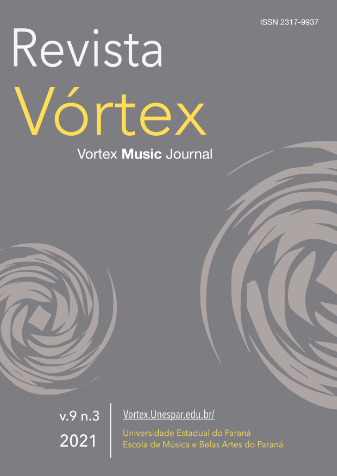Some Compositional Approaches in the Practice of live-electronic music from the perspective of technique and technological tools
DOI:
https://doi.org/10.33871/23179937.2021.9.3.8Palavras-chave:
live-electronics, technical object, musical poetics, compositional processResumo
Tools and their technical frameworks impact directly the compositional processes, thus, placing itself as an element of fundamental importance, either in the conception of poetic ideas and images or in the technical realization of a work. In this sense, the present work aims to discuss some aspects of the correlation between technics, poetics, aesthetics, and musical writing in the context of interactive/live-electronics music. This takes place from a dialogue between the ideas of authors and composers, such as Gilbert Simondon, Helmut Lachenmann, and Pierre Boulez about technical frameworks and their implications in musical practice. Thus, we aim to discuss the interrelation between technological devices, musical elements, and poetic images, which are established within the compositional process. These reflections will serve as a theoretical field to introduce and describe some characteristics about compositional thinking of two-piece: "Espasmos" (2017), for trombone and live-electronics, by Vinicius Cesar, and "Caminhos que Levam" (2018), for clarinet and live-electronics, by Thales Roel.Downloads
Referências
BOULEZ, Pierre. MusicLessons: The Collège de France Lectures. [S.l.]: Faber&Faber,2018.
CATANZARO, Tatiana. Transformações na linguagem musical contemporânea instrumental e vocal sob a influência da Música Eletroacústica entre as décadas de 1950-70. 1. ed. [S.l.]: 7 letras, 2018.
CHADABE, Joel. InteractiveComposing: Na Overview. Computer Music Journal, The MIT Press, v.8, n.1, p.22–27, 1984. ISSN 0148-9267.
CONT, Arshia. On the creative use of score following and its impact on research. Proceedings of the 8th Sound and Music Computing Conference, SMC 2011, jul.2011.
DOUGLAS, Robert L. Formalizing na African-American aesthetic. New art examiner., p.18–24, 1991. OCLC:39965335.
HOLMES, Bryan. Tecnomorfismo em música: uma visão teórica e prática. jan. 2019. Accepted: 2019-06-17T21:46:00Z. Disponível em: http://www.repositorio-bc.unirio.br:8080/xmlui/handle/unirio/12855
LACHENMANN, Helmut. Über das Komponieren. In: Musik Als Existentielle Erfahrung: Schriften 1966-1995. Wiesbaden: Breitkopf&Härtel,1996. p.73–82.
LEMOUTON, Serge; MANOURY, Philippe. Suivi de partition, reconnaissance d"™événements musicaux. Journées d"™Informatiquemusicale, v.98, p.1–9, maio 1998.
LEWIS, George E. Interacting with latter-day musical automata. Contemporary Music Review, Routledge, v. 18, n.3, p.99–112, jan.1999. ISSN0749-4467.
LEWIS, George E. Too Many Notes: Computers, Complexity and Culture in Voyager. Leonardo MusicJ ournal, v.10, p.33–39, dez.2000. ISSN 0961-1215.
MALT, M. Khorwa: A musical experience with « autonomous agents ». In: ICMC. [S.l.: s.n.], 2004.
MANNING, Peter. Electronic and Computer Music. [S.l.]: Oxford University Press, 2004.Google-Books-ID: P2dClS4LdPQC. ISBN 978-0-19-514484-0.
PADOVANI, José Henrique. O instrumento imaginário: o paradigma instrumental na criação musical. XXVII Congresso da Associação Nacional de Pesquisa e Pós-Graduação em Música. Campinas, 2017.
PUCKETTE, Miller. Max at Seventeen. Computer Music Journal, MIT Press, v.26, n.4,p.31–43,dez.2002. ISSN0148-9267.
ROWE, Robert. Interactive Music Systems: Machine Listening and Composing.Cambridge: MIT Press, 1993.
SIMONDON, Gilbert. Do modo de existência dos objetos técnicos. [S.l.]: PROMETEO LIBROS, 2010.ISBN978-987-574-197-3.
SIMONDON, Gilbert. L"™ invention dans les techniques: cours et conférences. Paris: Seuil, 2005. ISBN 978-2-02-056337-6.
VELLOSO, José Henrique Padovani. Música e técnica: reflexão conceitual, mecanologia e criação musical. Tese (Doutorado) "” Universidade Estadual de Campinas, 2013. Accepted: 2018-08-24T04:43:20Z Publisher: [s.n.]. Disponível em: http://repositorio.unicamp.br/jspui/handle/REPOSIP/284497
Downloads
Publicado
Como Citar
Edição
Seção
Licença
Copyright (c) 2022 Vinícius Cesar de Oliveira, Thales Roel P. Pessanha

Este trabalho está licenciado sob uma licença Creative Commons Attribution 4.0 International License.
Autores mantêm os direitos autorais e concedem à revista o direito de primeira publicação, com o trabalho simultaneamente licenciado sob a Licença Creative Commons Attribution que permite o compartilhamento do trabalho com reconhecimento da autoria e publicação inicial nesta revista.






